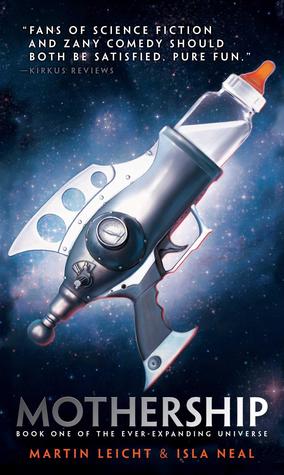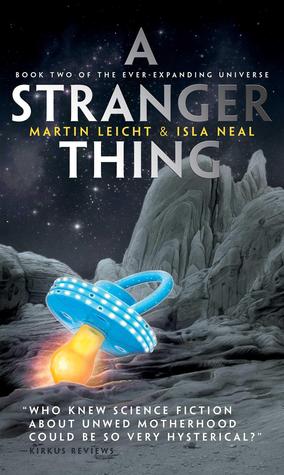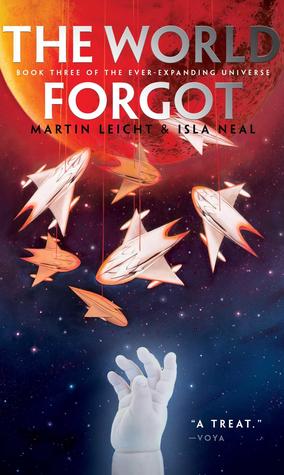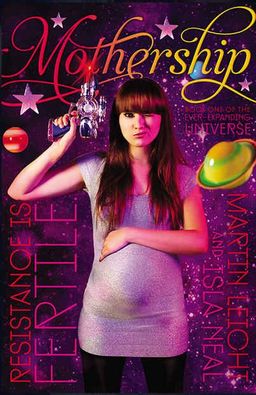The Series Series: The Ever-Expanding Universe by Martin Leicht and Isla Neal
 |
 |
 |
Two publishers asked if we’d try something unusual. It was the same unusual thing — reviewing an entire trilogy in one go — for two different series and two different reasons.
One series, Brian Stavely’s The Emperor’s Blades, was about to conclude. The other, Martin Leicht and Isla Neal’s The Ever-Expanding Universe, had been published by one imprint as YA, and was being given a second chance as a series for adults by another imprint of the same house. Though I knew reviewing two trilogies in this way would reduce the number of posts I made to BG this year considerably, I was curious. So here we are.
The Ever-Expanding Universe follows the adventures of a daring young engineer whose dreams of interplanetary exploration and college, not necessarily in that order, seem at first to be dashed by a bout of teen pregnancy. Thanks to the cover copy, it’s no spoiler to tell you that the young engineer’s baby daddy and not-quite-boyfriend turns out to be of extraterrestrial ancestry, and the most contested commodities in a resource war between two alien species are the bodies of the girls at the near-earth-orbit boarding school for unwed mothers where Elvie Nara has gone to hide from her high school nemesis.
Is it worse when Cole Archer, the sort-of-boyfriend, turns out to be an alien commando, or when Cole’s definitely-girlfriend and Elvie’s aforementioned cheerleader nemesis Britta McVicker turns out to be one of Elvie’s classmates for prenatal yoga? The three of them, and an impressively varied passel of other gravid girls seriously irked at having been tricked by alien boyfriends, spend the first volume of the series, Mothership, dodging ruthless alien attackers and fleeing through a booby-trapped and sabotaged space cruise ship refitted as a high school.
It’s a delightful mix of suspense, fight scenes, engineering puzzles involving transitions from one gravity or atmospheric environment to another, slapstick comedy, social satire, secret history, and stuff blowing up real good, all delivered by a hilariously smart first-person-smartass narrator you want to see triumph. How could any SFF reader resist? How did we miss this series when it first came out? Why is it not already a classic of humorous science fiction?

Its first imprint released the three volumes of The Ever-Expanding Universe with deeply unfortunate cover art and with jacket copy that buried the lede. All the adventure stuff came several sentences after openings like — and I am not making this up — “Teen pregnancy? Been there, done that.” Look at those sentences. Do you want to buy their book? Me, neither. And neither, apparently, did the girls the publisher initially expected to be the audience.
It’s not that surprising that I, as a mother in her 40’s, identified immediately with Elvie’s struggles. It might be surprising that my husband, a dad in his 40’s, found the series so irresistible that the two of us raced each other through the review copies of Mothership and A Stranger Thing, and that we mourned together during the weeks when the third volume, The World Forgot, was lost in the book-clutter of our living room. Teens whose main way of relating to pregnancy is anxious avoidance were never going to be right there in the thick of it with Elvie the way readers will be who have ridden the emotional roller coaster of parenthood or attempted parenthood.
Remember how Buffy the Vampire Slayer found ways to literalize and mythicize the experiences of adolescence and high school, and it didn’t matter how many years distant those experiences were for us — those stories took us right back? The Ever-Expanding Universe gathers up so many of the worries and struggles of starting a family and makes them brilliantly, goofily literal. Did you feel back then like your body was no longer your own? Like your child was some kind of alien invader who made everything familiar strange? Like members of the opposite sex, who could not understand your side of the experience firsthand, were more alien to you than ever? Like inhuman social institutions had designs on your child that had nothing to do with its well-being? Elvie experiences all those fears in Mothership, only for her they’re the absurd reality, and she has to fight her way through them by hotwiring escape shuttles and fleeing from heavily-armed creatures with an unsightly anatomical profusion of literal heavy arms.
In A Stranger Thing, Elvie and her dear ones, including her baby, hide in an alien prison colony on Antarctica. They’re in a news blackout about the ongoing war between the friendlier but high-handed aliens who’ve been nudging history along on Earth for centuries and the unabashedly predatory aliens who mean to use humanity up in their short-term plan for galactic dominance. She’s completely unprepared to mother the child she had thought she would give up for adoption, back before her world started exploding with, like, actual explosions. Now she’s awash in devotion she doesn’t know how to put to work, in a place where she has almost nothing to work with. The friends and family members imprisoned with her are even more out of their element than she is. Flashes of parental joy, almost unbearable in their brightness, are here, too, not as a trite motivation but as the primal glories they are.
The experience I think every caregiver to young children has had — of picking a baby up after a growth spurt or a new developmental milestone and thinking, Who is this strange child, and what happened to my familiar, perfect baby who was smaller, weaker, less capable? — takes on a literal resonance in this story that almost, almost, communicates how deeply disorienting the real life version is. Nobody knows just how much Elvie’s kid will be able to do, or when. Of course, the differences in family culture between a mother with an all-human upbringing and a father who found out in his early teens that he was from a species of extraterrestrial superhumans (and how would he ever measure up to them?), lead to parenting conflicts that are as world-shattering as real-life ones can feel to a new parent’s sleep-deprived, hormone-addled brain.
Post-climate-crisis Antarctica, with its unresolved consequences of global melting and refreezing, is approximately as incompatible with infant survival as the world outside the house can feel to parents of a newborn. The secrets Elvie learns about her own ancestry — and doesn’t parenthood cast a new light on your own family history? — drive her out of her dubious shelter in the prison colony and force her into adventures as challenging and heroic as her rescue of her fellow young moms in Mothership was.
Allies new and old aid her, enemies new and old resist her. Elvie will find out the truth in the crash site of the school she escaped from, no matter how many miles of fragile ice she has to cross to get there. Along the way, she and her dear ones will give us a glorious mix of wisecracks cheap and priceless, devastating vulnerability, ingenious problem-solving, edge-of-the-seat fight scenes, and explosions. Lots and lots of gratifying explosions.
Thanks again to the jacket copy, it’s not a big spoiler for me to say that the third volume, The World Forgot, begins with Elvie and her dear ones setting out to rescue her stolen child. Thanks to the comedic nature of the story and the authors’ good faith, we already know the child will eventually be regained and some strange configuration of happy ending will ensue. Thanks to the authors’ madcap creativity and emotional honesty, we get to be surprised many times over by what that happy ending entails.
Along the way to the happy ending, we get to see something I wish we saw in more places: a child-in-peril plot that is not cheap, easy, or gimmicky. When we see Cole and Elvie and the people who love them risk everything, attempt the impossible-but-for-Elvie’s-engineering-prowess, and take the fate of all Earth on their shoulders, their motivation feels real. The familial love that drives them is not a check-box excuse. The missing child is not interchangeable with all other fictional missing children. Anyone who has been caregiver to a child has feared some version of this experience, and anyone who’s cared for a child who could walk independently has probably been through some version of it. The number of times I had to call a Code Adam in retail establishments when my boys were toddlers… I’d be embarrassed about it, but anyone else who’s left the house with multiple toddlers has probably been through the same. There is no terror like the terror that you may just have seen your child for the last time, that your child needs you and your help will never reach him. Hollywood movies gesture casually in the general direction of that terror and call their efforts good enough. The World Forgot honors it by opening it up to any reader willing to look, and stays with all the crazy things that cross a parent’s mind on the way to what she desperately hopes will be the other side.
The abductors’ trail leads to a fascinating science-fictional setting, an orbital ozone-processing factory that’s part debtors’ prison, part generation ship. Essential functions related to not blowing up are sacred. Functions related to insignificant things — and in this floating city, all forms of other humans’ well-being are insignificant to the space station’s elites — are allowed to decay into a shocking Bacigalupiesque setting. Elvie arms herself with humor, as always, and we enjoy that with her. But she promises the people who help her there that she will not forget what she has seen, and there’s a bit of resonance for us, too. What labor force can be more captive or more exploited than one that would have to brave reentry to planetary atmosphere in order to escape? We’ll see that, maybe in our lifetimes — though without the bonus alien space fights Elvie has to brave when she finally busts out of that place.
It does get hard to dodge spoilers three volumes into a series review. I can tell you that Elvie accomplishes one of her early dreams and goes to Mars. That journey means something completely different as the end of the series nears than she had expected it to mean in the early chapters of the first volume. She’s tougher and more tested than she ever expected to become, bearing a greater responsibility than she could have imagined anyone bearing. It’s the small, mundane things she’s learned, as much as the vast ones, that save the day. Her friends and family have leveled up, too, and each one of them gets a late-stage aristeia. In the end, with the world as well saved as Elvie and her allies can make it, there are a few family matters to work out. As all mothers must, Elvie reaches a resolution about her own mother and all her mother’s secrets. Cole rises above some things Elvie had mistaken for limitations, and accepts limitations he has had to recognize, to become the best father he can be. Their child has a wide-open future that will undoubtedly be full of love, wisecracks, heroic space combat, and explosions.
Sarah Avery won the 2015 Mythopoeic Fantasy Award for her novella collection, Tales from Rugosa Coven. The Trafficking in Magic, Magicking in Traffic anthology she coedited with David Sklar includes stories by James Enge, Elizabeth Bear, and Darrell Schweitzer. Her own short stories have appeared Jim Baen’s Universe, Fantasy Scroll Magazine, and the last print issue of Black Gate. Sarah’s an escaped academic who survived earning a Ph.D. in English literature, and an ambivalently entrepreneurial private tutor. Her Kickstarter project, The Imlen Brat, will be available in October 2016. You can keep up with her and subscribe to download a free short story at her website, sarahavery.com, and follow her on Twitter.
Yes, I have been accused of having no sense of humor, though some friends might argue that, and others, they were the ones who said it in the first place.
But humorous SF-F, and humorous mysteries just seem…wrong. Sure, there are exceptions, such as Eric Frank Russell and Douglas Adams. Mostly, though, if a SF/F books is identified as funny, I’ll skip it.